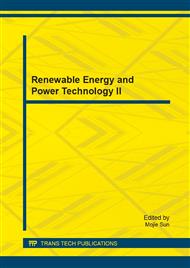p.2098
p.2106
p.2112
p.2117
p.2122
p.2127
p.2132
p.2140
p.2146
Study on the Model of the Stability of International Energy Cooperative
Abstract:
The world economy entering the era of cooperation and competition, in this case, cooperation has become the basic state of the economy. During the developing process, the change of cooperative stability, which determines cooperative trajectory, is a key scientific problem on collaboration. Cooperative intensity, whose size directly determines the intensity of stability on the cooperation system and affects the evolutive boundary of the cooperative system, is endogenous variables affecting the cooperative stability. In recent years the cooperative strength and the cooperative stability has become a hot research topic on cooperation projects. This paper, drawing on the relative research of other scholars, proposing the concept of cooperative strength, which to discuss how did the endogenous factors affect the cooperative stability, using the relationship between them, builds the model of cooperative stability according with the energy fields, and verifies the existence of stability in cooperative system. The results show that in the evolution of stability of cooperative system, cooperative strength is the internal factor which determines the cooperitive stability. The interaction among the effective factors of the cooperative strength restricts the trajectory of cooperative stability. Its trajectory is complex, but there is still a boundary, which can make cooperative system reach stable state.
Info:
Periodical:
Pages:
2122-2126
Citation:
Online since:
October 2014
Authors:
Keywords:
Price:
Сopyright:
© 2014 Trans Tech Publications Ltd. All Rights Reserved
Share:
Citation:


